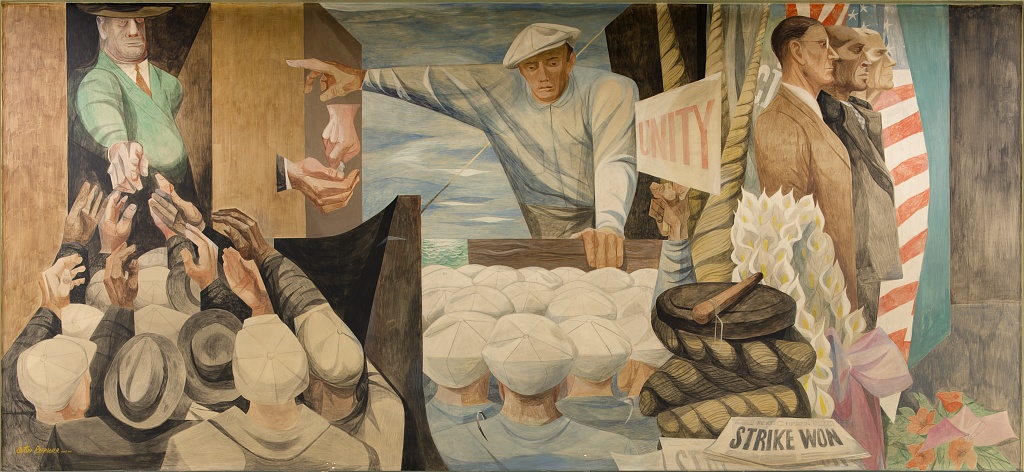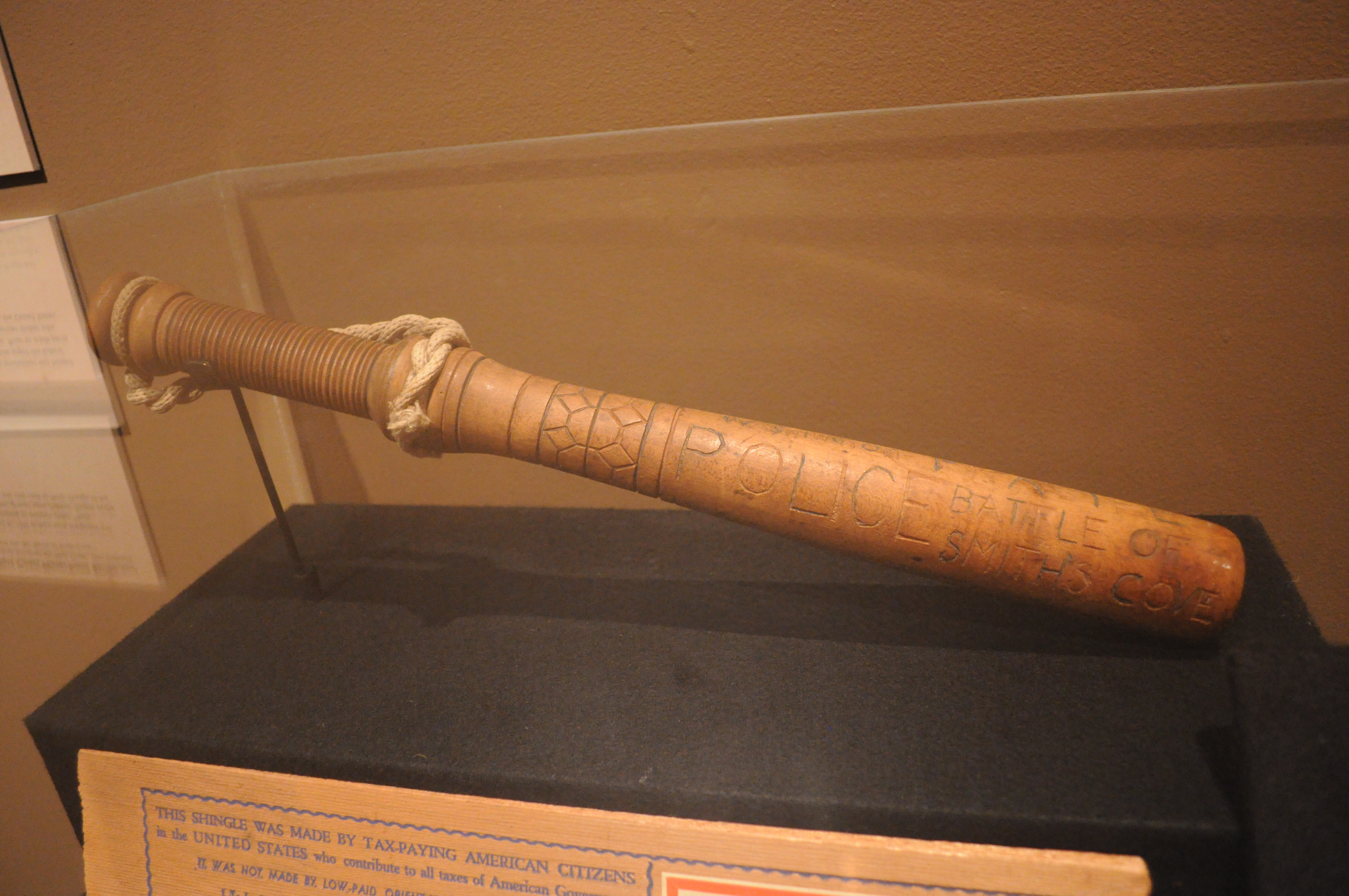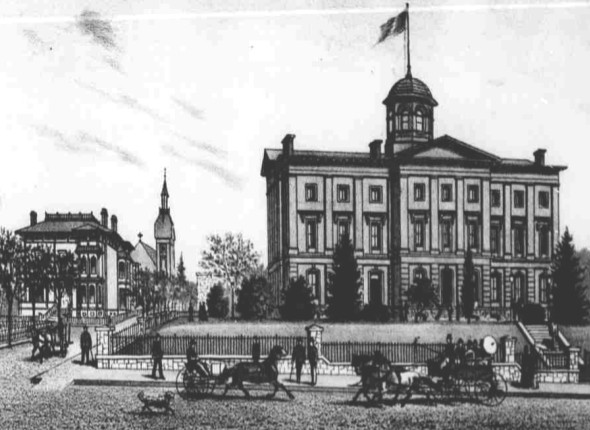|
Harry Bridges
Harry Bridges (28 July 1901 – 30 March 1990) was an Australian-born American union leader, first with the International Longshoremen's Association (ILA). In 1937, he led several chapters in forming a new union, the International Longshore and Warehouse Union (ILWU), expanding members to workers in warehouses, and led it for the next 40 years. He was prosecuted for his labor organizing and designated as subversive by the U.S. government during the 1930s, 1940s, and 1950s, with the goal of deportation. This was never achieved. Bridges became a naturalized citizen in 1945. His conviction by a federal jury for having lied about his Communist Party membership when seeking naturalization was overturned by the Supreme Court in 1953 as having been prosecuted untimely, outside the statute of limitations. His official power was reduced when the ILWU was expelled by the CIO in 1950, but he continued to be re-elected by the California membership and was highly influential until his retirem ... [...More Info...] [...Related Items...] OR: [Wikipedia] [Google] [Baidu] |
1934 West Coast Waterfront Strike
The 1934 West Coast Waterfront Strike (also known as the 1934 West Coast Longshoremen's Strike, as well as a number of variations on these names) lasted 83 days, and began on May 9, 1934 when longshoremen in every US West Coast port walked out. Organized by the International Longshore and Warehouse Union (ILWU), the strike peaked with the death of two workers on "Bloody Thursday" and the San Francisco General Strike which stopped all work in the major port city for four days and led ultimately to the settlement of the West Coast Longshoremen's Strike. The result of the strike was the unionization of all of the West Coast ports of the United States. The San Francisco General Strike of 1934, along with the Toledo Auto-Lite Strike of 1934 led by the American Workers Party and the Minneapolis Teamsters Strike of 1934 led by the Communist League of America, were catalysts for the rise of industrial unionism in the 1930s, much of which was organized through the Congress of Indust ... [...More Info...] [...Related Items...] OR: [Wikipedia] [Google] [Baidu] |
San Francisco General Strike
The 1934 West Coast Waterfront Strike (also known as the 1934 West Coast Longshoremen's Strike, as well as a number of variations on these names) lasted 83 days, and began on May 9, 1934 when longshoremen in every US West Coast port walked out. Organized by the International Longshore and Warehouse Union (ILWU), the strike peaked with the death of two workers on "Bloody Thursday" and the San Francisco General Strike which stopped all work in the major port city for four days and led ultimately to the settlement of the West Coast Longshoremen's Strike. The result of the strike was the unionization of all of the West Coast ports of the United States. The San Francisco General Strike of 1934, along with the Toledo Auto-Lite Strike of 1934 led by the American Workers Party and the Minneapolis Teamsters Strike of 1934 led by the Communist League of America, were catalysts for the rise of industrial unionism in the 1930s, much of which was organized through the Congress of Industri ... [...More Info...] [...Related Items...] OR: [Wikipedia] [Google] [Baidu] |
International Longshore And Warehouse Union
The International Longshore and Warehouse Union (ILWU) is a labor union which primarily represents dock workers on the West Coast of the United States, Hawaii, and in British Columbia, Canada. The union was established in 1937 after the 1934 West Coast Waterfront Strike, a three-month-long strike that culminated in a four-day general strike in San Francisco, California, and the Bay Area. It disaffiliated from the AFL–CIO on August 30, 2013. The union, which still uses hiring halls, has a single labor contract with the Pacific Maritime Association which covers all 29 seaports on the west coast of the US, from Bellingham, Washington, to San Diego; its 15,000 dockworkers were paid an average of $171,000 in 2019. The union has been described as "the aristocrat of the working class" and their members "lords of the docks" for their high pay and power over a choke point of the global economy. 20th century history The ILWU retained San Francisco-based law firm of Gladstein, And ... [...More Info...] [...Related Items...] OR: [Wikipedia] [Google] [Baidu] |
Horse Racing
Horse racing is an equestrian performance sport, typically involving two or more horses ridden by jockeys (or sometimes driven without riders) over a set distance for competition. It is one of the most ancient of all sports, as its basic premise – to identify which of two or more horses is the fastest over a set course or distance – has been mostly unchanged since at least classical antiquity. Horse races vary widely in format, and many countries have developed their own particular traditions around the sport. Variations include restricting races to particular breeds, running over obstacles, running over different distances, running on different track surfaces, and running in different gaits. In some races, horses are assigned different weights to carry to reflect differences in ability, a process known as handicapping. While horses are sometimes raced purely for sport, a major part of horse racing's interest and economic importance is in the gambling associated with ... [...More Info...] [...Related Items...] OR: [Wikipedia] [Google] [Baidu] |
Franklin D
Franklin may refer to: People * Franklin (given name) * Franklin (surname) * Franklin (class), a member of a historical English social class Places Australia * Franklin, Tasmania, a township * Division of Franklin, federal electoral division in Tasmania * Division of Franklin (state), state electoral division in Tasmania * Franklin, Australian Capital Territory, a suburb in the Canberra district of Gungahlin * Franklin River, river of Tasmania * Franklin Sound, waterway of Tasmania Canada * District of Franklin, a former district of the Northwest Territories * Franklin, Quebec, a municipality in the Montérégie region * Rural Municipality of Franklin, Manitoba * Franklin, Manitoba, an unincorporated community in the Rural Municipality of Rosedale, Manitoba * Franklin Glacier Complex, a volcano in southwestern British Columbia * Franklin Range, a mountain range on Vancouver Island, British Columbia * Franklin River (Vancouver Island), British Columbia * Franklin Strai ... [...More Info...] [...Related Items...] OR: [Wikipedia] [Google] [Baidu] |
Matson Navigation Company
{{disambiguation ...
Matson may refer to: *Matson (surname) *Matson, Gloucester, England, a suburb of Gloucester *Matson, Missouri, an unincorporated community *2586 Matson, an asteroid * Matson, Inc., a shipping company, formerly Matson Navigation Company *Matson Films, American film distributor See also *Mattson Mattson is a Swedish patronymic surname, meaning "son of Matt (shortened form of Matthew)". It is rare as a given name. People * Brad Mattson, Silicon Valley entrepreneur * Eli Mattson, pianist, singer, and runner-up on America's Got Talent * ... [...More Info...] [...Related Items...] OR: [Wikipedia] [Google] [Baidu] |
Seattle, Washington
Seattle ( ) is a port, seaport city on the West Coast of the United States. It is the county seat, seat of King County, Washington, King County, Washington (state), Washington. With a 2020 population of 737,015, it is the largest city in both the U.S. state, state of Washington and the Pacific Northwest region of North America. The Seattle metropolitan area's population is 4.02 million, making it the List of metropolitan statistical areas, 15th-largest in the United States. Its growth rate of 21.1% between 2010 and 2020 makes it one of the nation's fastest-growing large cities. Seattle is situated on an isthmus between Puget Sound (an inlet of the Pacific Ocean) and Lake Washington. It is the northernmost major city in the United States, located about south of the Canada–United States border, Canadian border. A major gateway for trade with East Asia, Seattle is the fourth-largest port in North America in terms of container handling . The Seattle area was inhabited by Nat ... [...More Info...] [...Related Items...] OR: [Wikipedia] [Google] [Baidu] |
Portland, Oregon
Portland (, ) is a port city in the Pacific Northwest and the largest city in the U.S. state of Oregon. Situated at the confluence of the Willamette and Columbia rivers, Portland is the county seat of Multnomah County, the most populous county in Oregon. Portland had a population of 652,503, making it the 26th-most populated city in the United States, the sixth-most populous on the West Coast, and the second-most populous in the Pacific Northwest, after Seattle. Approximately 2.5 million people live in the Portland metropolitan statistical area (MSA), making it the 25th most populous in the United States. About half of Oregon's population resides within the Portland metropolitan area. Named after Portland, Maine, the Oregon settlement began to be populated in the 1840s, near the end of the Oregon Trail. Its water access provided convenient transportation of goods, and the timber industry was a major force in the city's early economy. At the turn of the 20th century, the ... [...More Info...] [...Related Items...] OR: [Wikipedia] [Google] [Baidu] |
Syndicalism
Syndicalism is a Revolutionary politics, revolutionary current within the Left-wing politics, left-wing of the Labour movement, labor movement that seeks to unionize workers Industrial unionism, according to industry and advance their demands through Strike action, strikes with the eventual goal of gaining Social ownership, control over the means of production and the economy at large. Developed in French labor unions during the late 19th century, syndicalist movements were most predominant amongst the Socialism, socialist movement during the interwar period which preceded the outbreak of World War II. Major syndicalist organizations included the General Confederation of Labour (France), General Confederation of Labor in France, the National Confederation of Labour (CNT) in Spain, the Italian Syndicalist Union (USI), the Free Workers' Union of Germany, and the Argentine Regional Workers' Federation. Although they did not regard themselves as syndicalists, the Industrial Workers ... [...More Info...] [...Related Items...] OR: [Wikipedia] [Google] [Baidu] |
American Federation Of Labor
The American Federation of Labor (A.F. of L.) was a national federation of labor unions in the United States that continues today as the AFL-CIO. It was founded in Columbus, Ohio, in 1886 by an alliance of craft unions eager to provide mutual support and disappointed in the Knights of Labor. Samuel Gompers was elected the full-time president at its founding convention and reelected every year, except one, until his death in 1924. He became the major spokesperson for the union movement. The A.F. of L. was the largest union grouping, even after the creation of the Congress of Industrial Organizations (CIO) by unions that were expelled by the A.F. of L. in 1935. The Federation was founded and dominated by craft unions. especially the building trades. In the late 1930s craft affiliates expanded by organizing on an industrial union basis to meet the challenge from the CIO. The A.F. of L. and CIO competed bitterly in the late 1930s, but then cooperated during World War II and a ... [...More Info...] [...Related Items...] OR: [Wikipedia] [Google] [Baidu] |
Marine Workers Industrial Union
The Marine Workers Industrial Union (MWIU) was a short-lived union (1930-1935), initiated by the Communist Party of the USA (CPUSA). History In 1927, CPUSA member George Mink traveled to the USSR, attended the fourth congress of the Profintern, and returned to the US as the Profintern's representative of a Transport Workers International Committee for Propaganda and Agitation (TWICP&A) to organize maritime workers in the US. Working with William Z. Foster's Trade Union Educational League (TUEL), he established a Marine Workers Progressive League (MWPL) by 1928. During the CPUSA's factional in-fighting 1928-1929 between followers of James P. Cannon, Jay Lovestone, and Foster, Mink laid low. When Joseph Stalin appointed Foster as head of the CPUSA in 1929, Mink continued his efforts with marine workers. On April 26–27, 1930, a Marine Workers' League of New York (itself organized in 1928 by the Trade Union Unity League or "TUUL") called a convention that created the Marine Wor ... [...More Info...] [...Related Items...] OR: [Wikipedia] [Google] [Baidu] |
National Industrial Recovery Act
The National Industrial Recovery Act of 1933 (NIRA) was a US labor law and consumer law passed by the 73rd US Congress to authorize the president to regulate industry for fair wages and prices that would stimulate economic recovery. It also established a national public works program known as the Public Works Administration (PWA). The National Recovery Administration (NRA) portion was widely hailed in 1933, but by 1934 business opinion of the act had soured. The legislation was enacted in June 1933 during the Great Depression as part of President Franklin D. Roosevelt's New Deal legislative program. Section 7(a) of the bill, which protected collective bargaining rights for unions, proved contentious (especially in the Senate). Congress eventually enacted the legislation and President Roosevelt signed the bill into law on June 16, 1933. The Act had two main titles . Title I was devoted to industrial recovery, authorizing the promulgation of industrial codes of fair compet ... [...More Info...] [...Related Items...] OR: [Wikipedia] [Google] [Baidu] |







